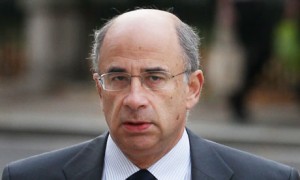
![]()
![]()
Module One of the judge led Leveson inquiry into the culture, practice and ethics of the British press following the phone-hacking scandal at News of the World, took evidence in Module One of the relationship between the press and the public. The list of core participants, many of whom gave oral evidence at the inquiry for this module read like a roll-call from British public life, including celebrities such as the singer Charlotte Church and the actor Hugh Grant, as well as more private individuals affected deeply by press intrusion, including the McCann family and Christopher Jefferies, who was arrested in connection with the murder of Joanna Yates, and later released without charge. A number of politicians and police officers also gave evidence.
The organisation Inclusion London, along with 10 disabled peoples’ organisations and individuals (including me and my friend and former colleague, the journalist John Pring), also submitted evidence to be considered in Module One – about the way in which the press writes about disabled people, particularly recently during the war on words regarding the reform of disability benefits. (The NUJ is also submitting evidence on this.)
We sat back and waited – hoping that at least one organisation would be called to give oral evidence about the effect that some inaccurate and unbalanced reporting of disability benefits was having on individual disabled people on the streets and in their homes. We were given to understand that it would either be dealt with in Module One or on Module Four on Regulation – or both. One organisation eventually contacted Leveson this week to see if there was any progress and was told that all our evidence had been considered – but was not considered important enough to deserve oral session. This is despite the evidence about the effect of such drip-feeding of lies, damn lies and statistics (a recent study has demonstrated that due to such reporting, the public now believes that between 50-75% of disability benefit claims are fraudulent, when the government’s own figures estimate it as less than 1%)
Why? Why is it not important when disabled individuals are attacked in the street, partly because of pernicious stories put about by newspapers? Why is wheelchair user Peter Greener’s experience of three months of harassment because his neighbour had once seen him walking and branded him a scrounger not important? I believe that journalists, including myself, have a responsibility to report accurately and, crucially, to contextualise. I believe that some journalists are over-hyping the extent of disability benefit fraud and are getting away with it while disabled people are paying the price.

I believe that Lord Justice Leveson, and his tax-payer funded inquiry, should do something about it. This inquiry should not merely hear the famous victims of newspaper harassment, or those who have become famous, unwillingly and in great pain, because of individual tragedy. This inquiry should also hear those silenced and fearful voices from a whole community which is trying to speak out – of the disabled victims who just make it into the local newspapers because they have been tipped out of their wheelchairs or shouted at in the street because of irresponsible newspaper reporting using the dangerous rhetoric of “scroungers” and other pernicious untruths. Leveson owes it to those individuals, who are not famous, who won’t necessarily make the headlines, but who deserve justice, to hear their stories – to honour their pain, and to question those reporters who are, at least, partly responsible.
OUR OPEN LETTER TO THE LEVESON INQUIRY
Open season on disabled people? Submission to the Leveson inquiry
Inclusion London, a pan-London Deaf and disabled people’s organisation, together with supporting organisations and networks of disabled people below, are making this submission to voice our growing alarm and concern at the increasingly hostile and inaccurate portrayal of disabled people in the media, and what we believe are clear links between this media coverage and the rise in harassment and hate crime of disabled people. We also share a wider concern about the Government’sapparent role[1] in contributing to this sustained level of unfair and inaccurate reporting.
Our submission responds primarily to questions 5,7,8 and 10 that the inquiry is requesting evidence on.
Unfair and inaccurate media reporting
Recent research by Glasgow university, commissioned by Inclusion London[2] confirms what hundreds of thousandsof disabled people know already: that disabled people are being demonised in the press, that fair and accurate reporting, particularly in relation to disability benefit fraud, has gone out the window and that this in turn is changing public perceptions and treatment of disabled people – for the worse.
The drip feed of daily headlines such as the ‘Disabled Benefit? Just fill in a form’ [3], ‘No more £35k BMWs for Motability drivers: new rules will stop disabled getting luxury cars on taxpayer’ [4]and particularly the constant repeating of wildly inaccurate statistics such as ‘75% on sick are skiving’[5] are having a real and tangible impact on public perceptions of disabled people.
The Glasgow university research suggests the public believe rates of disability benefit fraud are at a 50-75% level and when asked why citearticles such as the headlines above[6]. Actuals levels of disability benefit fraud, as shown by the DWP, stand in stark contrast to these wildly exaggerated claims, at a figure of just 0.3%[7]
Links to disability harassment and hate crime.
These sustained levels of unfair, biased and outrageously inaccurate reporting are havinga direct impact on disabled people’s lives. Disabled people, and their organisations, are reporting more and more hostility, harassment and violence against disabled people and as a result many hundreds of thousands of disabled people are living in fear. Stories such as that experienced by Peter Greener below, are occurring up and down the country:
‘A nightmare neighbour launched a hate crime against a wheelchair user – branding him a benefit scrounger because he had seen him walking. David McGregor bullied Peter Greener..in a three-month torrent of abuse which ended when he sprayed offensive graffiti on his fence calling him a “lowlife” ‘[8]
The recent Equality and Human Rights Commission report ‘Hidden in Plain sight’ provides the most up to date picture of the depth and extent that disability hate crime blights our lives and highlights the role the media has in ‘influencing attitudes to harassment’ and ‘the power of the media to positively or negatively impact on disabled peoples lives’.[9]
Press practices, ethics and standards
Our alarm at the link between current unfair and outrageously inaccurate media coverage and disability hate crime is shared by many. NUJ’s Disabled Members Council recently issued a statement ‘urging journalists to operate within our recognised code of ethics’ and ‘support and sustain fair and balanced reporting of matters relating to disabled people’.
We welcome and support this call for fair and balanced reporting yet we are increasingly concerned that such reporting is apparently being actively undermined by the Government and in particular the way Ministers appear to be briefing the press and using DWP statistics. More and more reports are emerging of Ministers, such as Ian Duncan Smith, providing quotes to certain sections of the press,using selective and not representative government statistics, that end up as the headlines detailed above[10]which in turn feed the lie of disability benefit fraud.
We are not alone in our concern regarding the relationship between Government and the press over the coverage of disability issues. On the 27 July 2011 Anne Begg Chair of Work and Pensions Committee wrote to Employment Minister Chris Grayling expressing the committee’s serious concern at the most recent misrepresentation of DWP statistics in sections of the media stating ‘that more care is needed in the way the Government engages with the media’ and ‘in the way it releases and provides its commentary on official statistics on the IB reassessment’.
We are extremely concerned that the Government appears to be using whatever means it can to justify cuts of £9 billion[11] of basic entitlements from disabled people. Cuts that will push hundreds of thousands of disabled people further into poverty, exclusion and isolation – a situation that is already resulting in disabled people taking their own lives.[12]
We believe:
- The Government must issue a clear and public rebuttal every time the media release inaccurate information citing Government / DWP statistics.
- That the Government commit to full transparency in their dealings with the press including keeping a publically available record of all communications between Government officials, Ministers, their aides and special advisors and the media.
- That there needs to be an independent review of how the DWP releases and provides commentary on its statistics to assess how fair and balanced this data is presented and communicated.
- That the EHRC must carry out further research on the impact of media coverage on disabled people and the implications this has for disability hate crime, disabled people’s protection under The Equalities Act and the UN Convention on the rights of disabled people.
We call on the Leveson inquiry, Press Complaints Commission, and OFCOM to:
- Carry out an independent investigationinto the media reporting of disabled people. This investigation needs to include the impact this coverage is having on disabled people and the implications this biased and inaccurate reporting has for the culture, practices, ethics and standards of the press. It must also examine the opportunities disabled people should have for effective redress.
Yours faithfully,
Tracey Lazard,Chief Executive, Inclusion London
Disabled People Against Cuts
Jaspal Dhani, Chief Executive, United Kingdom Disabled Peoples Council
Transport for All
Tara Flood, Chief Executive, Alliance for Inclusive Education
Islington Disabled People Against Cuts
Stephen Brookes: Coordinator – Disability Hate Crime Network
Black Triangle Anti-Defamation Campaign in Defence of Disability Rights
Adam Lotun, Lindsay Barlow, Shaaba Lotun, Zoubie Lotun, Peergawsan Lotun, Lindsay Lotun, Tehya Lotun, Tazanna Lotun
Mik Scarlet: Broadcaster and Journalist
Disability Action in Islington
[1] http://www.inclusionlondon.co.uk/department-spins-dla-figures
[2] Bad news for disabled people: How the newspapers are reporting disability. Strathclyde Centre for Disability Research and Glasgow Media Unit October 2011. Commissioned by Inclusion London
[3] Daily Mail 11 November 2011
[4] Daily Mail 25 November 2011
[5] Daily Express 26 January 2011
[6]Bad news for disabled people: How the newspapers are reporting disability page 61. Strathclyde Centre for Disability Research and Glasgow Media Unit October 2011. Commissioned by Inclusion London
[7] DWP Incapacity Benefit July 2011
[8] The Shields Gazette 25 November 2011
[9] EHRC: Hidden in plain sight: Inquiry into disability related harassment’ report page 158-159
[10] Disability News service 18 November 2011
[11] Demos report: Destination Unknown 2010
[12] See http://www.bbc.co.uk/news/uk-england-coventry-warwickshire-15645206 on the double suicide of Mark and Helen Mullins
http://www.inclusionlondon.co.uk/inclusion-londons-letter-to-leveson-inquiry

Hi I have no protection whatever under the Equalities act nor Any British term for Human Right’s.
I’m not a member of Brittish Socirty. merely a victim of some of it’s organisations who harbour abusers within their midst.
It’s because organisations that abuse me that I can’t get justice. I fear dur to many a Media outlet over the years has had me living in fear. ”Are you afraid yet” Might jog a few memories.
I woke up this morning counting those who have directly grossly discriminated against me causing severe permanent harm 14 I quickly came up with. ”Systematic organisation led abuses” The obvious. They are attaching the term Mental Health to their deliberate denial.
Just a shame we cant find a few caring honest and determined ”Media” To defend the helpless against Organisation’s clearly dangerously out of control.
Paul Davidson.